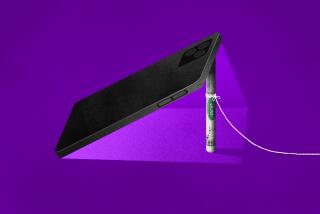The Cutting Edge: COMPUTING / TECHNOLOGY / INNOVATION : Software to Help You Be Right on the Money
- Share via
January is a great time to seize control of your personal finances, to figure out where you stand and where you’re going. Although some still swear by the old-fashioned ledger, the more modern-minded can choose among three excellent personal finance programs for personal computers.
Personal finance programs let you keep track of what you spend and earn, and stay on top of loan payments, credit card accounts and other financial transactions. Instead of writing checks by hand, you fill in the blanks on a screen. The programs record the information in a ledger and, at your option, print the checks for you on special blank computer checks.
As it performs these basic functions, the software helps you keep track of how your money flows. Use one of these programs to write a check to your credit card company, for example, and the amount is automatically deducted from your check register and credited to your credit card register.
Don’t expect miracles. For the most part, the accuracy of your record-keeping depends on what you enter. The programs I review here can’t call up your bank to verify your balance or see if a check has cleared. There are home banking programs that do these things, but they’re tied to specific banks. Eventually, these personal finance programs will be able to interact with any bank, but such services are not yet in place.
Quicken, from Intuit, is by far the best-selling personal finance program, with an estimated 75% of the finance market. Its success certainly impressed Microsoft Corp., which has an agreement to buy Intuit for $1.5 billion if the U.S. Justice Department approves.
I’ve been using Quicken for about three years, and, for me, it’s more than just a piece of software. It’s my ticket to financial sanity. It hasn’t put any money in my pocket, but it’s helped me keep track of the money I have, maintain a clean credit rating, and sock away money for retirement and other goals.
In September, Intuit issued new Mac, Windows and DOS versions of Quicken with several new features, most of which make the program easier to use. There is also a new Deluxe version that comes on both CD-ROM and floppy disk. Intuit’s competitors--Block Financial Software, which publishes Managing Your Money (DOS, Windows and Mac), and Computer Associates, the publisher of Kiplinger’s Simply Money (Windows)--have also released excellent new versions in the past few months.
Even though it has some nice features, I’m not recommending Microsoft Money at this time because that program has an uncertain future. If the Microsoft/Intuit deal goes through, Microsoft will sell the product to Novell.
Quicken, Managing Your Money (MYM) and Simply Money have a lot in common. All have a street price of between $30 and $40, and all can be used to write checks, maintain a budget and keep tabs on credit cards, loans and investments. All of the programs will print computer-generated checks and let you pay bills electronically via the CheckFree service.
CheckFree lets you use your modem to transmit payment orders, via a local call, to a central processing center in Ohio. CheckFree pays the bill and deducts the money from your account. Unlike some bill-paying services, it works with any financial institution that issues checks and can send money to anyone, including individuals. It costs about $10 a month for each 20 payments.
All three personal finance programs also provide access to an automated stock-quote system that dials into the CompuServe service to look up the current value of your stocks, mutual funds and other securities. The data automatically flows to your investment registers and updates the value of your portfolio. CompuServe members can use this service at no extra charge. Others dial a 900 number and pay $1 a minute.
Quicken is the only program to offer automated on-line credit card tracking. To use it, you have to sign up for and use the Quicken Gold Visa Card, which, in addition to paper statements, issues monthly statements on-line via a toll-free call or on a floppy disk. All credit card transactions are automatically entered into the appropriate register. I use my Quicken credit card for business-related purchases so that I don’t have to worry about entering the data at the end of the month.
All three programs also print a wide range of reports and allow you to track a personal budget. The report features not only help you understand where you are, but also make it very easy to prepare financial statements and other documents that you might need for a loan or other transaction.
None of the programs can fill out tax forms, but they do export data to TurboTax, TaxCut and other tax-preparation programs. Quicken and Managing Your Money have tax-planning features to help you estimate taxes throughout the year. Getting my tax data ready for my CPA used to take days. It now takes about half an hour.
All the programs can be used to calculate loan payments, compare mortgages and analyze a savings or investment program, but Managing Your Money is the strongest when it comes to planning and analysis features. It has the ability to determine bond yields, future value of compounded savings accounts and the cost or proceeds of loans. It’s the only program that makes it easy to determine the cost of a short-term (less than one year) loan.
Kiplinger’s Simply Money has a nice feature that lets you establish an icon for each income source and payee and make payments or deposits by dragging the icon for the payee or income source to the icon for the appropriate account. To pay your phone bill, for example, you just drag the phone company icon to the checking icon. You still have to enter in the amount and write the check, but this feature makes the process a little more pleasant.
The Windows CD-ROM version of Quicken Deluxe has some multimedia features, including “Ask the Experts,” an interactive presentation where you get to listen to some basic advice from financial gurus Jane Bryant Quinn and Marshall Loeb. The multimedia element makes it entertaining, but don’t expect any great revelations: You can get the same type of information from books and articles.
*
Computer File welcomes your comments. Write to Lawrence J. Magid, Computer File, Los Angeles Times, Times Mirror Square, Los Angeles, CA 90053, or message magid@latimes.com on the Internet or KPVN58A on Prodigy.
More to Read
Inside the business of entertainment
The Wide Shot brings you news, analysis and insights on everything from streaming wars to production — and what it all means for the future.
You may occasionally receive promotional content from the Los Angeles Times.










